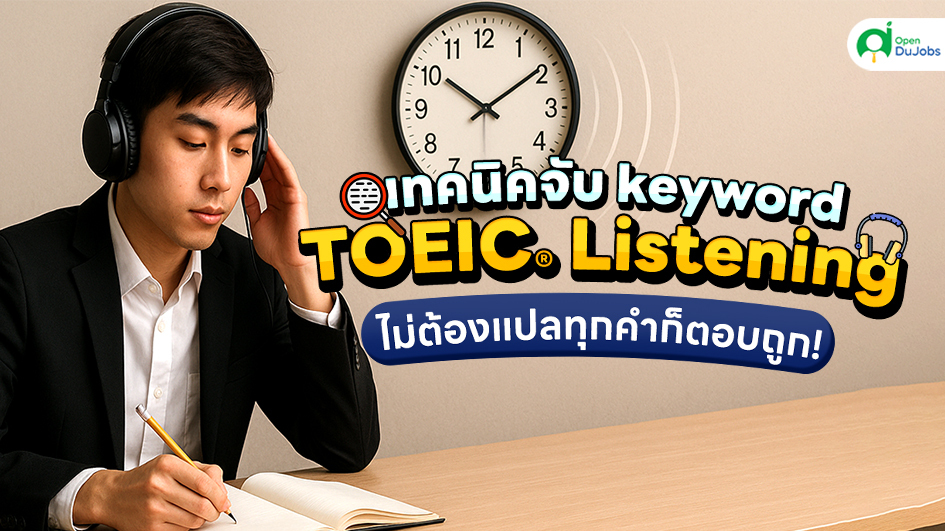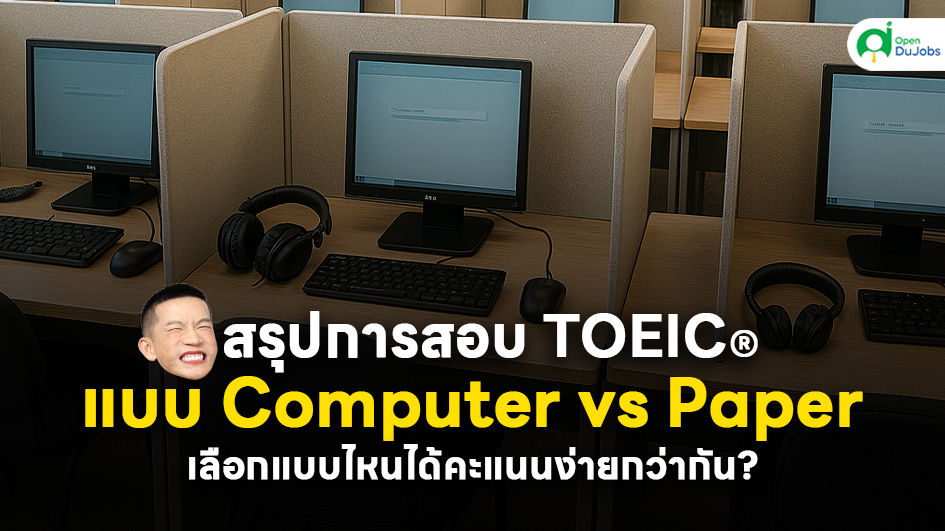หนึ่งในกับดักที่พบบ่อยที่สุดในข้อสอบ TOEIC คือคำศัพท์ที่มีรูปแบบคล้ายกัน ความหมายคล้ายกัน หรือการใช้งานที่ต่างกัน ทำให้สับสนและตอบผิด บทความนี้รวมคำที่มักสับสนในข้อสอบ TOEIC® พร้อมเทคนิคจำที่ใช้ได้จริง
หมวด 1: คำที่สะกดคล้ายกัน แต่ความหมายต่างกัน
| Affect vs. EffectAffect (v.) = กระทบ, ส่งผลต่อ, มีผลกระทบ Effect (n.) = ผล, ผลกระทบ Effect (v.) = ทำให้เกิด, ทำให้สำเร็จ (ใช้น้อย) ตัวอย่าง The new policy will affect all employees. (กระทบทุกคน – กริยา) The effect of the policy is positive. (ผลกระทบเป็นบวก – คำนาม) ✅วิธีจำ Affect = Action (กริยา) Effect = End result (ผลลัพธ์/คำนาม) |
| Accept vs. ExceptAccept (v.) = ยอมรับ, รับเข้า Except (prep.) = ยกเว้น, นอกจาก ตัวอย่าง We accept all major credit cards. (เรารับบัตรเครดิต) All staff members except John attended the meeting. (ทุกคนยกเว้นจอห์น) ✅วิธีจำ Except มี Ex = Exclude (ไม่รวม, ยกเว้น) |
| Advice vs. AdviseAdvice (n.) = คำแนะนำ Advise (v.) = แนะนำ, ให้คำแนะนำ ตัวอย่าง Thank you for your advice. (ขอบคุณสำหรับคำแนะนำ) I advise you to apply early. (ฉันแนะนำให้คุณสมัครเร็วๆ) ✅วิธีจำ คำนามมักลงท้าย -ice, กริยามักลงท้าย -ise/-ize |
| Compliment vs. ComplementCompliment (n./v.) = คำชม, การชมเชย Complement (n./v.) = สิ่งที่เสริม, ส่วนเติมเต็ม ตัวอย่าง She received many compliments on her presentation. (ได้รับคำชม) The new system complements our existing process. (เสริมกระบวนการที่มี) ✅วิธีจำ Compliment = I like (ฉันชอบ-ชม), Complement = Complete (เติมเต็ม) |
| Compliment vs. ComplementCompliment (n./v.) = คำชม, การชมเชย Complement (n./v.) = สิ่งที่เสริม, ส่วนเติมเต็ม ตัวอย่าง She received many compliments on her presentation. (ได้รับคำชม) The new system complements our existing process. (เสริมกระบวนการที่มี) ✅วิธีจำ Compliment = I like (ฉันชอบ-ชม), Complement = Complete (เติมเต็ม) |
| Principal vs. PrinciplePrincipal (n.) = ผู้อำนวยการ, เงินต้น Principal (adj.) = หลัก, สำคัญที่สุด Principle (n.) = หลักการ, หลักคำสอน, ธรรมเนียม ตัวอย่าง The principal reason for the change is cost reduction. (เหตุผลหลัก – คุณศัพท์) We must follow the company’s principles. (หลักการของบริษัท) ✅วิธีจำ Principal = pal (เพื่อน/คน), Principle = rule (กฎ/หลักการ) |
🔴ปรึกษาการสอบ TOEIC® หรือสอบถามข้อมูลเพิ่มเติม คลิกเลย m.me/krudewenglishofficial
หมวด 2: คำที่ความหมายคล้ายกัน แต่ใช้ต่างกัน
| Assure vs. Ensure vs. InsureAssure (v.) = รับรอง, ให้ความมั่นใจ (ใช้กับคน) Ensure (v.) = ทำให้แน่ใจ, รับประกันว่า (ใช้กับเหตุการณ์/สิ่งของ) Insure (v.) = ทำประกัน ตัวอย่าง I assure you that we will deliver on time. (ฉันรับรองคุณ) Please ensure all documents are complete. (กรุณาตรวจให้แน่ใจ) We need to insure the shipment. (ต้องทำประกันสินค้า) ✅วิธีจำ Assure = คน (A person) Ensure = สิ่งของ/เหตุการณ์ (Events) Insure = ประกัน (Insurance) |
| Borrow vs. Lend vs. LoanBorrow (v.) = ยืม (จากคนอื่น) Lend (v.) = ให้ยืม (แก่คนอื่น) Loan (n.) = เงินกู้, สินเชื่อ Loan (v.) = ให้กู้ (ใช้ในอเมริกัน) ตัวอย่าง Can I borrow your pen? (ขอยืมปากกาได้ไหม – ฉันยืม) I can lend you some money. (ฉันให้คุณยืมเงินได้) He applied for a loan. (เขาสมัครขอสินเชื่อ) ✅วิธีจำ Borrow = ฉันรับ, Lend = ฉันให้ |
| Economic vs. EconomicalEconomic (adj.) = เกี่ยวกับเศรษฐกิจ Economical (adj.) = ประหยัด, คุ้มค่า ตัวอย่าง The economic situation is improving. (สถานการณ์เศรษฐกิจ) This car is very economical. (รถคันนี้ประหยัด) ✅วิธีจำ Economic = about economy (เกี่ยวกับเศรษฐกิจ) Economical = save money (ประหยัด) |
| Beside vs. BesidesBeside (prep.) = ข้างๆ, ติดกับ Besides (prep./adv.) = นอกจาก, ยิ่งไปกว่านั้น ตัวอย่าง Please sit beside me. (นั่งข้างๆ ฉัน) Besides English, she speaks French. (นอกจากอังกฤษ เธอพูดฝรั่งเศสด้วย) ✅วิธีจำ Beside = by the side (ข้างๆ) Besides = Be + sides = in addition (นอกจาก) |
| Between vs. AmongBetween = ระหว่าง (2 สิ่ง หรือสิ่งที่ระบุชัดเจน) Among = ท่ามกลาง (3 สิ่งขึ้นไป หรือกลุ่ม) ตัวอย่าง The meeting is between the CEO and CFO. (ระหว่าง 2 คน) She is popular among her colleagues. (ท่ามกลางเพื่อนร่วมงานหลายคน) ✅วิธีจำ Between = Two (2) Among = A group (กลุ่ม) |
หมวด 3: Prepositions ที่มักสับสน
| In vs. On vs. At (สถานที่)In = ใน (พื้นที่กว้าง, บรรยากาศ) On = บน (พื้นผิว) At = ที่ (จุดเฉพาะเจาะจง) ตัวอย่าง She works in Bangkok. (ในเมืองกรุงเทพ) The office is on Sukhumvit Road. (บนถนนสุขุมวิท) Meet me at the train station. (ที่สถานีรถไฟ – จุดเฉพาะ) |
| In vs. On vs. At (เวลา)In = ใน (เดือน, ปี, ช่วงเวลายาว) On = ใน (วัน, วันที่) At = ตอน (เวลาเฉพาะ) ตัวอย่าง The conference is in March. (ในเดือนมีนา) The deadline is on Monday. (ในวันจันทร์) The meeting starts at 3:00 PM. (ตอน 3 โมงเย็น) ✅วิธีจำ: ยิ่งเฉพาะเจาะจง ยิ่งใช้ at |
| For vs. Since vs. DuringFor = เป็นระยะเวลา (ระบุความยาว) Since = ตั้งแต่ (จุดเริ่มต้น) During = ในระหว่าง, ช่วงระหว่าง ตัวอย่าง I have worked here for five years. (เป็นเวลา 5 ปี) I have worked here since 2020. (ตั้งแต่ปี 2020) I visited Paris during the summer. (ในระหว่างฤดูร้อน) ✅วิธีจำ For = ระยะเวลา, Since = จุดเริ่มต้น, During = ช่วงเหตุการณ์ |

หมวด 4: คำที่เป็น False Friends (ใกล้เคียงภาษาไทย)
| Efficient vs. EffectiveEfficient (adj.) = มีประสิทธิภาพ (ทำได้เร็ว ประหยัดทรัพยากร) Effective (adj.) = มีประสิทธิผล (ได้ผลลัพธ์ที่ต้องการ) ตัวอย่าง This new machine is very efficient. (เครื่องใหม่ทำงานได้เร็วและประหยัด) The training program was effective. (โปรแกรมฝึกอบรมได้ผลดี) ✅วิธีจำ Efficient = Fast + Less waste (เร็วและไม่เสีย) Effective = Get results (ได้ผล) |
| Sensible vs. SensitiveSensible (adj.) = มีเหตุผล, สมเหตุสมผล Sensitive (adj.) = ละเอียดอ่อน, อ่อนไหว ตัวอย่าง That’s a sensible decision. (การตัดสินใจที่สมเหตุสมผล) She is very sensitive to criticism. (เธออ่อนไหวกับคำวิจารณ์) ✅วิธีจำ Sensible = Sense = makes sense (สมเหตุผล) Sensitive = Emotion (อารมณ์อ่อนไหว) |
| Personal vs. PersonnelPersonal (adj.) = ส่วนตัว, เป็นการส่วนบุคคล Personnel (n.) = บุคลากร, พนักงาน ตัวอย่าง This is my personal opinion. (ความเห็นส่วนตัว) The personnel department handles recruitment. (แผนกบุคคล) ✅วิธีจำ Personnel มี 2 n = multiple people (หลายคน) |
🔴ปรึกษาการสอบ TOEIC® หรือสอบถามข้อมูลเพิ่มเติม คลิกเลย m.me/krudewenglishofficial
หมวด 5: Word Forms ที่มักสับสน
| Require vs. Request vs. AcquireRequire (v.) = ต้องการ, จำเป็นต้องมี (บังคับ) Request (v./n.) = ขอร้อง, คำขอ (สุภาพ) Acquire (v.) = ได้มา, ได้รับ ตัวอย่าง All employees are required to attend. (จำเป็นต้องเข้าร่วม) I request your assistance. (ขอความช่วยเหลือ) The company acquired new equipment. (บริษัทได้อุปกรณ์ใหม่มา) |
| Raise vs. Rise vs. AriseRaise (v.) = ยก, เพิ่ม (กรรมตรง – ต้องมีกรรม) Rise (v.) = ขึ้น, เพิ่มขึ้น (กรรมไม่ตรง – ไม่ต้องมีกรรม) Arise (v.) = เกิดขึ้น, เกิดปัญหา ตัวอย่าง The company will raise salaries. (บริษัทจะขึ้นเงินเดือน – มีกรรม) Prices are rising. (ราคากำลังขึ้น – ไม่มีกรรม) A problem has arisen. (เกิดปัญหาขึ้น) ✅วิธีจำ Raise ต้องมีกรรม (raise something) Rise ไม่ต้องมีกรรม (something rises) |
| Lay vs. LieLay (v.) = วาง (กรรมตรง – ต้องมีกรรม) – laid, laid Lie (v.) = นอน, อยู่ (กรรมไม่ตรง – ไม่มีกรรม) – lay, lain Lie (v.) = โกหก – lied, lied ตัวอย่าง Please lay the documents on the table. (กรุณาวางเอกสารบนโต๊ะ) I need to lie down. (ฉันต้องนอนพัก) He lied about his experience. (เขาโกหกเกี่ยวกับประสบการณ์) ✅วิธีจำ Lay ต้องมีกรรม (lay something) Lie ไม่มีกรรม |
| Remember vs. Remind vs. RecallRemember (v.) = จำได้, ระลึกได้ Remind (v.) = เตือน, ย้ำเตือน Recall (v.) = เรียกคืน, นึกขึ้นได้ ตัวอย่าง I remember meeting you last year. (ฉันจำได้ว่าเคยเจอคุณ) Please remind me to call him. (ช่วยเตือนฉันโทรหาเขา) The company recalled the defective products. (บริษัทเรียกสินค้าชำรุดคืน) |
หมวด 6: Business Vocabulary ที่มักสับสน
| Salary vs. WageSalary (n.) = เงินเดือน (จ่ายรายเดือน, พนักงานประจำ) Wage (n.) = ค่าจ้าง (จ่ายรายชั่วโมง/รายวัน, แรงงาน) ตัวอย่าง Her annual salary is $50,000. (เงินเดือนต่อปี) The minimum wage has increased. (ค่าจ้างขั้นต่ำเพิ่มขึ้น) |
| Customer vs. Client vs. ConsumerCustomer = ลูกค้า (ซื้อสินค้าทั่วไป) Client = ลูกค้า (ใช้บริการมืออาชีพ เช่น ทนาย, ที่ปรึกษา) Consumer = ผู้บริโภค (ใช้สินค้า/บริการ, มุมมองกว้าง) ตัวอย่าง The store has many loyal customers. (ร้านมีลูกค้าประจำมาก) The law firm serves corporate clients. (สำนักงานกฎหมายให้บริการลูกค้าองค์กร) Consumers are demanding eco-friendly products. (ผู้บริโภคต้องการสินค้าเป็นมิตรสิ่งแวดล้อม) |
| Price vs. Cost vs. Fee vs. ChargePrice (n.) = ราคา (ที่ขาย) Cost (n.) = ต้นทุน, ค่าใช้จ่าย Fee (n.) = ค่าธรรมเนียม (บริการมืออาชีพ) Charge (n./v.) = เรียกเก็บ, ค่าบริการ ตัวอย่าง The price of the product is $100. (ราคาสินค้า) The cost of production has increased. (ต้นทุนการผลิต) The lawyer’s fee is $500 per hour. (ค่าบริการทนาย) There is no charge for delivery. (ไม่มีค่าบริการจัดส่ง) |
| Meeting vs. Conference vs. Seminar vs. WorkshopMeeting = การประชุม (ทั่วไป, ขนาดเล็ก) Conference = การประชุมใหญ่ (หลายวัน, หลายคน) Seminar = การสัมมนา (บรรยาย, มีวิทยากร) Workshop = การอบรม (ลงมือทำ, ฝึกปฏิบัติ) ตัวอย่าง We have a team meeting every Monday. (ประชุมทีมทุกจันทร์) The international conference will be held in July. (ประชุมระดับนานาชาติ) Attend the marketing seminar tomorrow. (เข้าสัมมนาการตลาด) Join our Excel workshop. (เข้าอบรม Excel) |
| Increase vs. Decrease vs. ImproveIncrease (v./n.) = เพิ่ม, เพิ่มขึ้น (ตัวเลข, ปริมาณ) Decrease (v./n.) = ลด, ลดลง (ตัวเลข, ปริมาณ) Improve (v.) = ปรับปรุง, ดีขึ้น (คุณภาพ) ตัวอย่าง Sales increased by 20%. (ยอดขายเพิ่มขึ้น 20%) Costs decreased significantly. (ต้นทุนลดลงอย่างมาก) We need to improve customer service. (ต้องปรับปรุงการบริการลูกค้า) ✅วิธีจำ Increase/Decrease = ตัวเลข Improve = คุณภาพ |
หมวด 7: Adjectives ที่มักสับสน
| Interested vs. InterestingInterested (adj.) = รู้สึกสนใจ (อธิบายความรู้สึกของคน) Interesting (adj.) = น่าสนใจ (อธิบายลักษณะของสิ่งของ) ตัวอย่าง I am interested in this position. (ฉันสนใจตำแหน่งนี้) This is an interesting project. (โปรเจกต์นี้น่าสนใจ) ✅กฎทั่วไป -ed: คนรู้สึก (bored, excited, confused) -ing: สิ่งของทำให้รู้สึก (boring, exciting, confusing) |
| High vs. TallHigh = สูง (ความสูงจากพื้นดิน, ระดับ) Tall = สูง (คน, ต้นไม้, อาคาร) ตัวอย่าง The building is very tall. (อาคารสูงมาก) Prices are high. (ราคาสูง) The mountain is high. (ภูเขาสูง) |
| Everyday vs. Every dayEveryday (adj.) = ธรรมดา, ประจำวัน (ขึ้นเป็นคำเดียว) Every day (adv.) = ทุกวัน (แยกเป็น 2 คำ) ตัวอย่าง These are everyday items. (สิ่งของใช้ประจำวัน) I go to work every day. (ฉันไปทำงานทุกวัน) |
Checklist: คำที่ต้องระวังในข้อสอบ TOEIC
เมื่อเจอคำเหล่านี้ในข้อสอบ ให้หยุดคิดสักครู่ ⛔
✓ คำที่สะกดใกล้เคียง (affect/effect, accept/except)
✓ คำนาม vs. กริยาที่สับสน (advice/advise)
✓ Prepositions (in/on/at, for/since/during)
✓ คำคุณศัพท์ที่ใกล้เคียง (economic/economical)
✓ Business vocabulary (salary/wage, client/customer)
✓ -ed vs. -ing adjectives (interested/interesting)
🔴ปรึกษาการสอบ TOEIC® หรือสอบถามข้อมูลเพิ่มเติม คลิกเลย m.me/krudewenglishofficial
ที่มา: https://www.opendurian.com/news/7-confusing-words-toeic/








